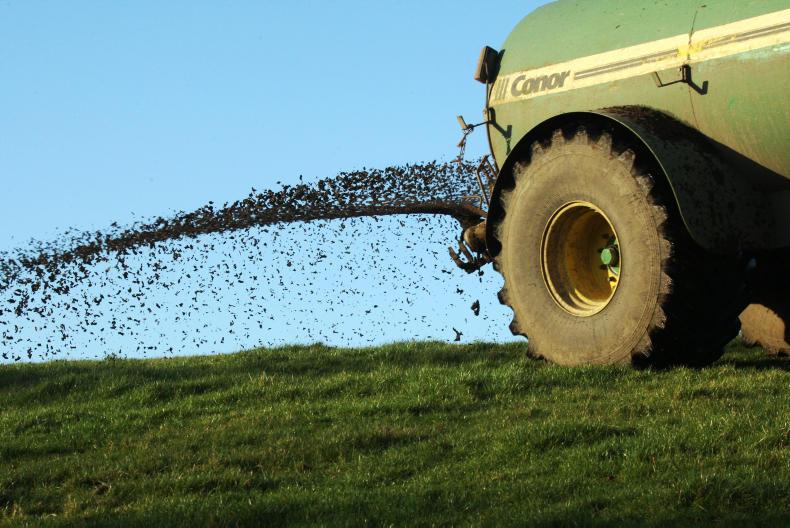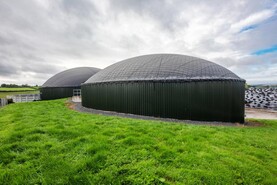New water and slurry management measures for derogation farmers in 2018 (and by 2021) caused ripples of concern at a farmer meeting in Co Tipperary this week.
A presentation by Seamus Barron from the Nitrates Division of the Department of Agriculture caused serious concern among 300 farmers at the Liffey Mills spring conference.
Barron was outlining some of the new measures in the recently re-negotiated Nitrates Action Programme for Ireland.
“The good news is Ireland has retained its Nitrate Derogation for the period 2018 to 2021, allowing farms to stock to 250kg organic nitrogen per hectare (2.9 cows/ha),” he told farmers.
“However, if water quality declines then it will be very difficult in four years’ time when we go to renegotiate with the EU for a continuation of the Irish derogation,” he warned.
“We have seen already where the Netherlands has been refused a derogation and Denmark only got an extended two-year derogation. It is up to farmers and everybody else to protect water quality and not let excess phosphorus or nitrates into ground water.”
Fencing
Barron went on to explain about the need for fencing off watercourses.
From 2021 onwards, waterways will have to be fenced off 1.5 metres back from the top of the bank. He suggested this would impact over 13,000 farmers stocked over 170kg organic nitrogen (2cows/ha).
Also from 2021, farmers will be expected to prevent run-off from farm roadways into overground water courses.
This means if a farm roadway has a drain beside it, then the camber of the roadway should be changed so that the run-off from the roadway goes into the field, rather than the drain.
Slurry regulations
Farmers at the event were exercised by the new restrictions on derogation farms, where half of winter slurry must be spread by 15 June, 2018.
Any slurry spread after that date must be spread using a low-emission system, such as a dribble bar or ground injection machine.
Some farmers in the audience expressed fears that there wasn’t enough suitable equipment available to carry out such a workload in 2018.
The other concern was the pressure on contractors around a very busy silage season.
Both Seamus Barron and Teagasc’s Donal Patton suggested it is imperative that farmers get some slurry out in spring, and the use of trailing shoes and dribble bars mean slurry can be spread on fields where there is some grass in the period of February to April.
Over 300 beef and dairy farmers attended the Liffey Mills spring conference, with guest speakers on the night including Doreen Corridan of Munster AI; Pat Ryan of Liffey Mills; Seamus Barron of the Department of Agriculture, Co Wexford, and Donal Patton of Teagasc, Ballyhaise.
Read more
Dairy farmers disadvantaged in TAMS
Stricter rules for farmers in next Nitrates Action Programme
New water and slurry management measures for derogation farmers in 2018 (and by 2021) caused ripples of concern at a farmer meeting in Co Tipperary this week.
A presentation by Seamus Barron from the Nitrates Division of the Department of Agriculture caused serious concern among 300 farmers at the Liffey Mills spring conference.
Barron was outlining some of the new measures in the recently re-negotiated Nitrates Action Programme for Ireland.
“The good news is Ireland has retained its Nitrate Derogation for the period 2018 to 2021, allowing farms to stock to 250kg organic nitrogen per hectare (2.9 cows/ha),” he told farmers.
“However, if water quality declines then it will be very difficult in four years’ time when we go to renegotiate with the EU for a continuation of the Irish derogation,” he warned.
“We have seen already where the Netherlands has been refused a derogation and Denmark only got an extended two-year derogation. It is up to farmers and everybody else to protect water quality and not let excess phosphorus or nitrates into ground water.”
Fencing
Barron went on to explain about the need for fencing off watercourses.
From 2021 onwards, waterways will have to be fenced off 1.5 metres back from the top of the bank. He suggested this would impact over 13,000 farmers stocked over 170kg organic nitrogen (2cows/ha).
Also from 2021, farmers will be expected to prevent run-off from farm roadways into overground water courses.
This means if a farm roadway has a drain beside it, then the camber of the roadway should be changed so that the run-off from the roadway goes into the field, rather than the drain.
Slurry regulations
Farmers at the event were exercised by the new restrictions on derogation farms, where half of winter slurry must be spread by 15 June, 2018.
Any slurry spread after that date must be spread using a low-emission system, such as a dribble bar or ground injection machine.
Some farmers in the audience expressed fears that there wasn’t enough suitable equipment available to carry out such a workload in 2018.
The other concern was the pressure on contractors around a very busy silage season.
Both Seamus Barron and Teagasc’s Donal Patton suggested it is imperative that farmers get some slurry out in spring, and the use of trailing shoes and dribble bars mean slurry can be spread on fields where there is some grass in the period of February to April.
Over 300 beef and dairy farmers attended the Liffey Mills spring conference, with guest speakers on the night including Doreen Corridan of Munster AI; Pat Ryan of Liffey Mills; Seamus Barron of the Department of Agriculture, Co Wexford, and Donal Patton of Teagasc, Ballyhaise.
Read more
Dairy farmers disadvantaged in TAMS
Stricter rules for farmers in next Nitrates Action Programme






 This is a subscriber-only article
This is a subscriber-only article










SHARING OPTIONS: